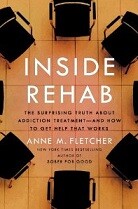Working out can help you sober up
Anne M. Fletcher, M.S., R.D.
“…one of the more promising and least talked about tools for treating and recovering from addiction is exercise.”
 My drinking began the way drinking usually begins: as part of teenage havin’ a good time and rebelling against strict parents. I wasn’t one of those drinkers who fell in love with alcohol at first sip. No, I had to work at it. To this day, I curse “Martini Mark,” a former flame so dubbed by my roommate and me because he “taught” me how to appreciate the gin-and-vermouth combination.
My drinking began the way drinking usually begins: as part of teenage havin’ a good time and rebelling against strict parents. I wasn’t one of those drinkers who fell in love with alcohol at first sip. No, I had to work at it. To this day, I curse “Martini Mark,” a former flame so dubbed by my roommate and me because he “taught” me how to appreciate the gin-and-vermouth combination.
When I was in my 20s, wine and occasional hard-liquor drinks on weekends became nightly martinis. Alcohol came to fill a hole in my spirit, temporarily erasing any sadness, stress, anger or guilt. I craved alcohol, but I also longed to be healthy, both physically and emotionally, and this inconsistency made me feel terrible. During my years of heavy drinking – primarily from my mid-20s to my early 30s – I was a jogger, often covering five miles, five times a week. But I used exercise as a punitive device: It redeemed me after an evening of drinking. Slowly, though, I began to realize that when I exercised, I felt better both in body and mind.
With the help of counseling from an addiction psychologist, I eventually quit drinking and learned to get my emotional needs met in ways that really did make me feel better. Since I no longer needed running for redemption, I came to appreciate exercise in a different way. It became a source of fulfillment and pleasure. It was running that now gave me the high I had been seeking in alcohol.
My own turnaround fueled my fascination with writing about others who’d changed—about once-overweight people who had slimmed down, about folks who had quit drinking. And one common thread among many of these “masters of change”—be it with sobriety or weight loss—is that they exercise. For my book, Sober for Good, I interviewed 222 people who overcame drinking problems and asked them how they seek pleasure without alcohol. Exercise was second only to relationships. It was also one of the most common ways that they kept themselves from returning to the bottle. Zoe A., who quit drinking when she was 27, spoke for all of us when she told me, “Exercise makes the journey more pleasant. I exercise to relieve anxiety, improve my mood, maintain my weight, increase my endurance. And it also helps me to be less vulnerable to the temptation of alcohol and drugs.” Exercise can also help improve sleep, serve as a time-filler (in place of alcohol and drug use), and help with connections to non-using friends who take part in healthy activities.
I truly believe that one of the more promising and least talked about tools for treating and recovering from addiction is exercise. And, although there isn’t yet much research on this in people, quite a few animal studies suggest that exercise may play a role in treating addiction. Several recent small studies suggest that people who exercise have more positive outcomes from substance abuse treatment than those who do not. For instance, according to a 2010 Brown University study, individuals who were addicted to drugs who participated in a 12-week moderate-intensity aerobic exercise program as part of their treatment had a significant increase in percentage of days abstinent from both drugs and alcohol at the end of treatment. And those who went to at least three quarters of the exercise sessions had significantly better substance use outcomes than those who didn’t.
 For my latest book, Inside Rehab, I found in visiting addiction treatment facilities around the country that a number of them are focusing on fitness as they emphasize holistic approaches to getting well in body, mind, and spirit. That’s a good question to ask about when looking for treatment.
For my latest book, Inside Rehab, I found in visiting addiction treatment facilities around the country that a number of them are focusing on fitness as they emphasize holistic approaches to getting well in body, mind, and spirit. That’s a good question to ask about when looking for treatment.
I wish it hadn’t taken me so long to figure this out—that I could have a good time and weather the bad times by turning to healthy forms of gratification. Now, when I Nordic-walk my five-mile loop through the woods, tour the countryside by bicycle, or get lost in a TV series while working out on the elliptical machine at the YMCA, I sort out problems and find the inner peace to deal with whatever life throws at me. Sometimes I think of Martini Mark and hope that he, too, has replaced his cocktails with long-distance running—or at least a good jog around the block.
©2002, Shape Magazine as “Exercise Helped Me Quit Drinking”. Revised and Reprinted with Permission
Used with permission from Psychology Today
Copyright (2013) Anne M. Fletcher, M.S., R.D. All Rights Reserved.
